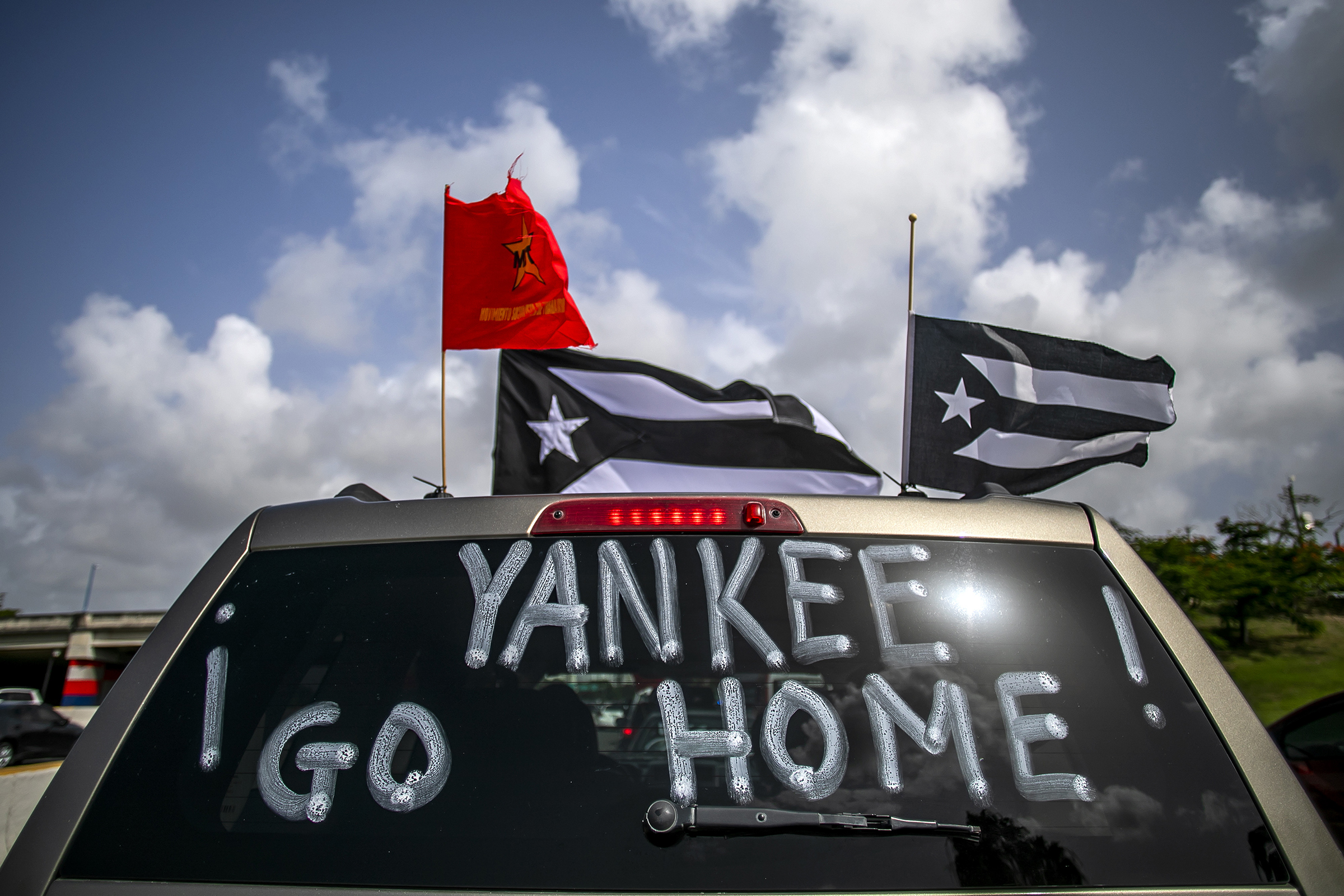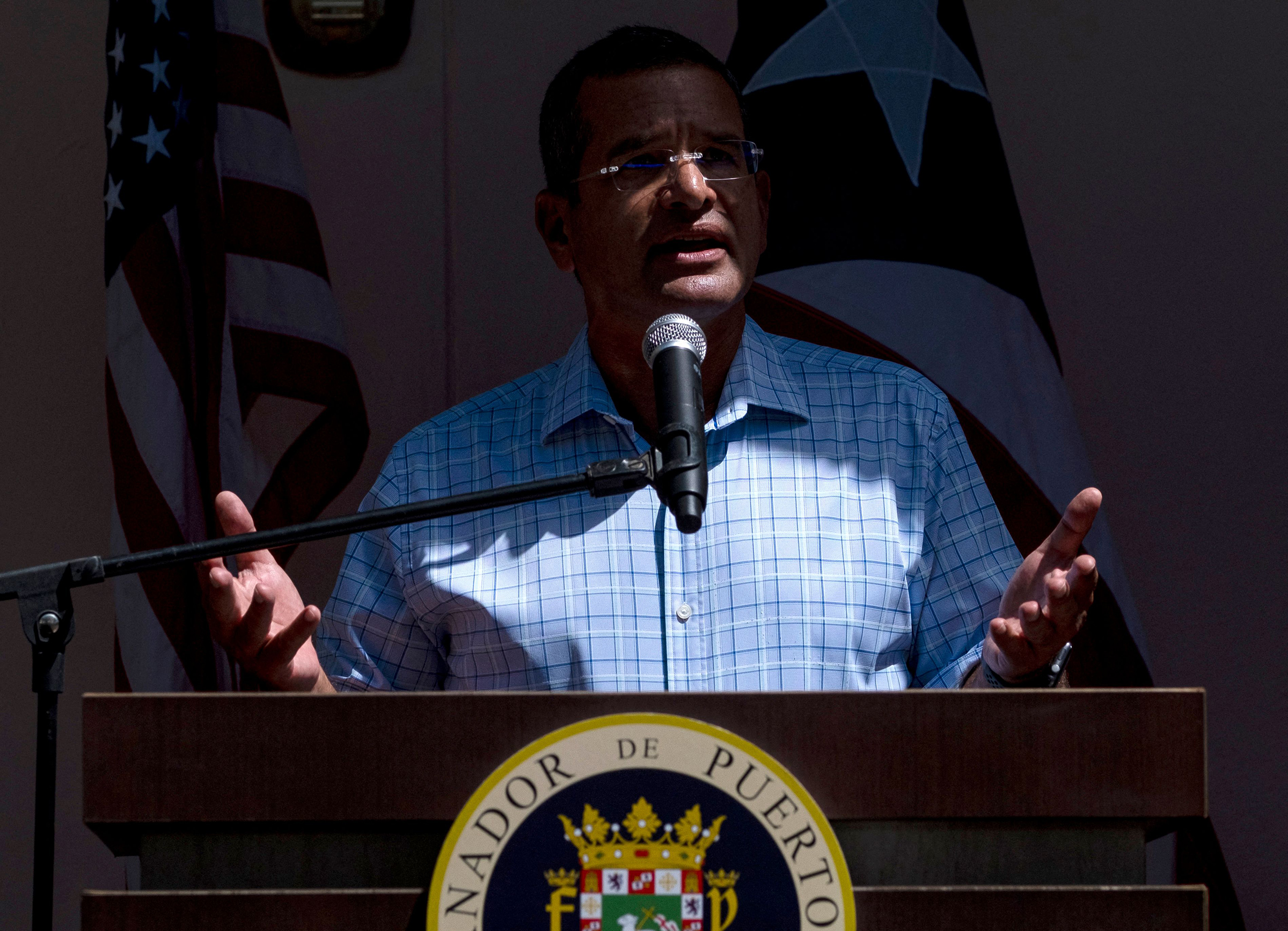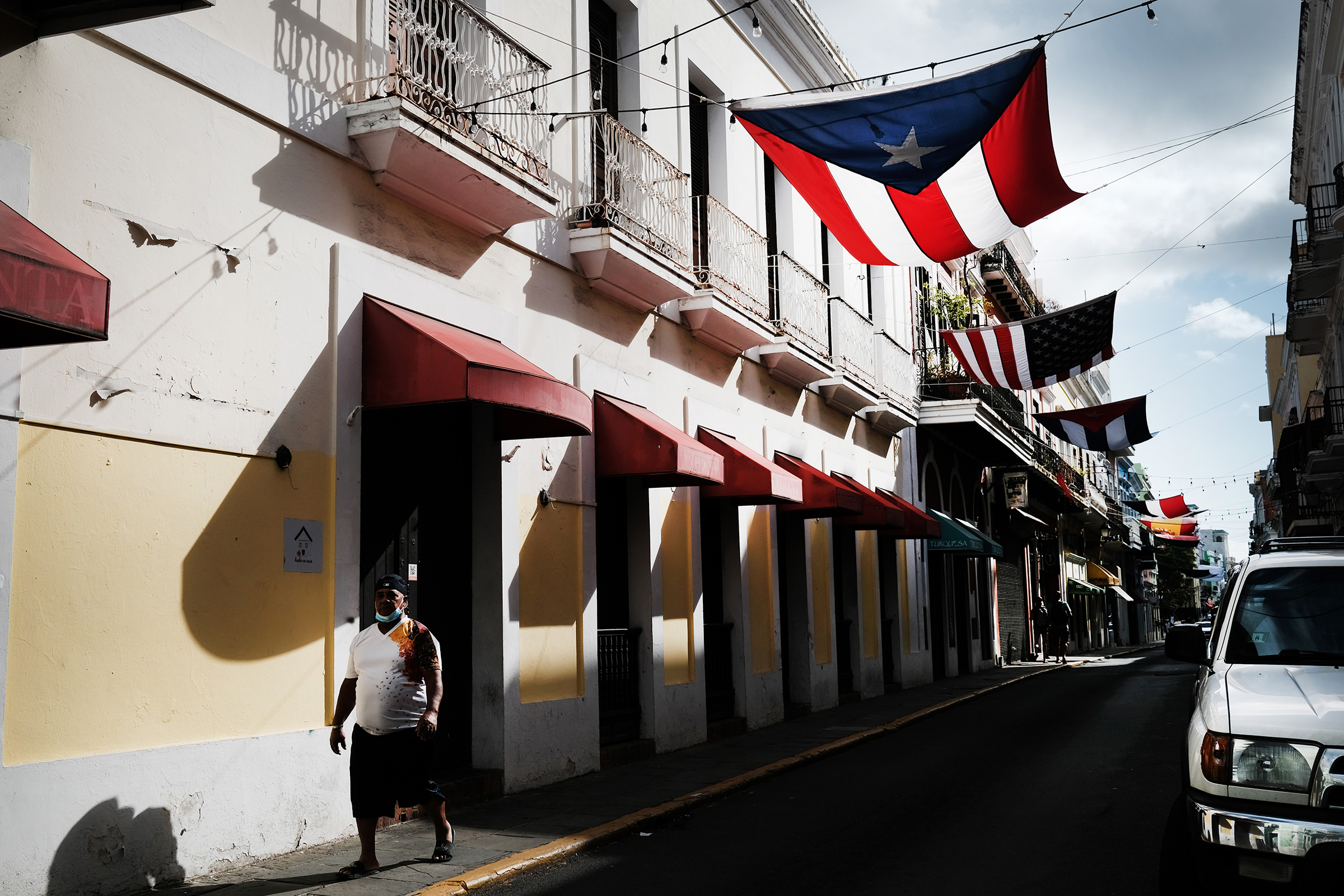
In February, YouTube influencer Logan Paul announced to his 20 million podcast followers that he was leaving Los Angeles to move to Puerto Rico. Paul, who is preparing for a high-profile boxing match with Floyd Mayweather later this year, said the move would be an opportunity to get “locked in [and] focused” on training. But, he admitted, the “primary reason” he was relocating was because of the Caribbean island’s tax breaks.
“It’s getting crazy here in California, paying taxes,” said Paul. “In Puerto Rico you’re motivated to do more and make more money because of the implications that come with it.”
Paul, who did not respond to requests for comment for this story, is part of a growing number of wealthy outsiders moving to Puerto Rico to take advantage of the island’s laws offering dramatically low tax rates. Since 2012, real estate developers, crypto currency tycoons and now big-name influencers have relocated to the island to bask in the Caribbean sun and unparalleled tax exemptions. The incentives, which apply mostly to non-Puerto Ricans, have brought much-needed revenue to the island’s battered economy, but have also deepened inequity on the island, driving up housing prices, pushing people out of their own neighborhoods, and making Puerto Ricans, including those who’ve left and want to go back, feel like outsiders in their own home.
“If anybody needs to be moving and buying in Puerto Rico, it needs to be the Puerto Rican people who had no other choice but to leave,” says María Torres-López, 38, who moved to Florida nearly twenty years ago to seek better economic opportunity for her family. Since then, she’s started Diáspora en Resistencia, a nonprofit that encourages Puerto Ricans overseas to get politically engaged. “I didn’t want to leave. I wanted more and my country wasn’t able to give it to me.”
For Torres-López and others fed-up with the influx of rich mainlanders, the internet celebrity’s announcement was a fresh call to action. The grassroots activist collective #AbolishAct60, whose name refers to the tax break laws, has started to ask for “gringos to go home,” and for Governor Pedro Perluisi to end the incentives. “The governor of Puerto Rico Pedro Pierluisi is trying to make our patria into Singapore,” the collective, whose members are anonymous, wrote on Instagram in March.
The government says Puerto Rico needs the money. The island currently has an unemployment rate of 9% and has been in a recession since the tax incentives began. In 2016, after the government declared its $72 billion debt “unpayable,” Congress passed a controversial law known as “PROMESA” to address the debt crisis, which has resulted in austerity measures and tough cutbacks on public services. Against that backdrop, the $210 million that companies set up under the tax break laws have infused in the economy between 2015 and 2019 are welcome. They have also created over 15,000 direct jobs paying nearly twice the average household income, according to a study commissioned by the Department of Economic Development and Commerce (DDEC). Over two-thirds of tax break recipients purchased property during the same time, investing collectively $1.3 billion in real estate.
For the laws’ growing number of critics, the trade-off isn’t worth it. Residents and Puerto Ricans in the diaspora alike say it encourages modern-day colonization, and are upset that most native Puerto Ricans aren’t eligible for the exemptions. They also worry that the law’s beneficiaries, who have the right to vote in Puerto Rico, may hold increasing sway over important local elections, including future referendums on whether or not Puerto Rico should seek to become a U.S. state.
“It is in these past years of tax havens and inaccessible incentives for natives that have strengthened and upheld colonialism,” says Alexandra-Marie Figueroa of Taller Salud, a Puerto Rican feminist group, and a vocal critic of Act 60. She says the tax laws were “crafted behind closed doors to make Puerto Rico a paradise for those that barge in and can afford it, but a life-sentence for those of us who try to hold on to what we have left of our country.”
‘There’s no negative for Puerto Rico.’

The growing rift between the rich outsiders and their critics has roots in the island’s status as an unincorporated territory of the U.S. All residents of Puerto Rico are exempt from U.S. federal taxes, and the Commonwealth government is in charge of making its own local tax laws. In 2012, the territory passed two laws, now known collectively as Act 60, designed to create a new revenue stream for the country. Under Act 20, export service companies that set up an office on the island can get a 4% corporate tax rate and full tax exemption on all dividends. If their annual revenue is over $3 million, they’re required to hire at least one local Puerto Rican employee.
The second law, Act 22, offers full exemption from all local taxes on passive income to individuals. Its beneficiaries are not allowed to have lived in Puerto Rico for the last ten years, and have to spend a certain number of days on the island to maintain their status. They also need to purchase residential property and donate at least $10,000 a year to a local non-profit. Between 2012 and 2019, 4,500 individuals and businesses have relocated their homes or businesses, primarily from the mainland U.S., to Puerto Rico under the Acts, according to the DDEC study. Numbers for 2020 aren’t yet available, but the DDEC projected the tax breaks would continue to grow in popularity through 2029.
For the last decade, the government has maintained that Act 60 is critical to aid Puerto Rico’s struggling economy. As economic opportunities have dwindled, millions of Puerto Ricans like Torres-López have been forced to leave to the mainland. The current government is in favor of pushing for statehood in Washington, where it would have to be approved, as a way to ensure federal investment in the local economy. “As a territory, the only tool you have is the fact that we have our own tax system,” Pierluisi, then serving as resident commissioner, said in a 2015 interview. But he was also skeptical about how well the tax laws were working. “We need to change the model,” he added.
Since taking over as governor last November, Pierluisi has kept the controversial laws in place. “My stance has always been that statehood for Puerto Rico is the best option,” Pierluisi tells TIME. Until then, Act 60 remains part of the ongoing “effort to attract population and new investment.” He’s been criticized widely on social media for personally gaining from the laws; his daughter-in-law, a real estate agent, is currently listed as an admin to the “Act 20/22 PR Real Estate Guide” Facebook group, which shares the latest real estate news and trends for its tax exempt members. Pierluisi denies that he and his family have benefited from the tax breaks.
Beneficiaries of the laws say the money they’ve brought has helped the island. “I want to make sure that it’s clear to the average Puerto Rican—to the degree that we can—that we’re here not just to be recipients, but we’re here to be contributors,” says Robb Rill, the founder of a private equity firm who moved to the island in early 2013 as one of the laws’ first grantees. He has since started the 20/22 Act Society, a private group for those who have relocated to the island under the incentives.
Rill says oceanfront areas like Condado and Dorado Beach that used to be in “complete disarray, and in some cases boarded up” with “no significant economic activity going on” are now booming with new construction and restaurants, thanks to the tax program.
“All the revenue that is brought to the island [and] all the investment that is brought to the island from these two acts are actually incremental revenue that otherwise would not be here,” says Rill. “There’s no negative for Puerto Rico. There’s only positive.”
‘It’s a matter of who takes over from here.’

#AbolishAct60 advocates describe all of these changes as “predatory” gentrification. Puerto Rico’s real estate market has been gaining momentum since Hurricane Maria devastated the island in 2017 and displaced thousands from their homes. More than 142,000 locals fled the island in the first year after the storm, according to census bureau data. As real estate prices dropped, investors moved in, and have driven up prices again in certain areas.
The result is that many Puerto Ricans can no longer afford to live in their own neighborhoods, including those who would like to come back home, activists say. The tax break laws are exacerbating the problem as people move to the island and snap up property. Popular areas off the east coast of the mainland like Vieques are being faced with a “tsunami of gentrification” as non-Puerto Ricans flock to the archipelago, Myrna Veda Pagan Gómez, a long-time Vieques resident, said at a 2018 United Nations Special Committee on Decolonization meeting.
“Right now Puerto Rico looks like the apocalypse hit it because of the government neglect,” says an #AbolishAct60 activist, who requested to remain anonymous because of the group’s policy. “It’s a matter of who takes over from here: Puerto Ricans or tax-incentivized foreign entities? There’s no excuse for them to create ‘opportunities’ by becoming owners of land our ancestors have inhabited for over 400 centuries.”
Activists have been mobilizing on social media to get their message out, creating online petitions and calling on the government to act. And in some cases, it seems to be working. Last month, local journalist Bianca Graulau noticed a “For Sale” sign go up on a beach-front plot behind her childhood home in Camuy. She knew the land was protected under a 2015 government plan for its agricultural potential. When the property’s realtor told her the land had a $1.1 million offer from a luxury real estate developer that was potentially linked to an Act 60 beneficiary, she said she felt her “heart sink.” Graulau recalls, “It’s a place where you grew up, where your family lives and where you spend your life.”
Graulau eventually decided to post a TikTok video detailing the situation. Less than 72 hours later, it went viral. Hundreds of thousands of people watched the video, reshared it and donated over $17,000 to a community land trust that works to protect land for sustainable agriculture. In just over a month, activists responding to Graulau’s video gathered over 9,500 signatures in an online petition calling on Pierluisi and the Puerto Rico Planning Board, the agency that created the land-use plan, to “prevent development that would be harmful to the environment and local communities.”
Facing mounting public pressure, Pierluisi eventually responded by recognizing up-to 7,420 acres of land as “nature and agricultural reserves” under the 2015 plan, including the 40-acre plot in Camuy. It may make it harder for the developer to purchase the plot, Graulau says, but it’s not a guarantee that the swathe of land that has given her neighborhood coastal access for generations won’t end up being built into condos for newcomers.
Pedro Manuel Cardona Roig, a former Vice President of the Planning Board, has been tracking this problem on his ‘El Urbanista’ Instagram account, trying to raise awareness about land planning issues on the island. Cardona Roig is concerned that Act 60 recipients will start buying land that is supposed to be protected under the plan, like in Camuy. “I don’t have a problem with beachfront property being sold,” Cardona Roig says. “The problem that I have is what is authorized to be developed in this beachfront property and whether it complies with the vision that we as a community have developed.”
In the U.S., members of the diaspora are trying to get lawmakers in Washington to pay attention to how Act 60 is driving gentrification on the island—and to put pressure on the government back home. There, too, they’ve had some success. “We ought to tell that governor, none of this bull—t where you let millionaires and billionaires escape taxes,” Senate Majority Leader Sen. Chuck Schumer said on a call with a Manhattan community board in February. He said he would not back the governor’s efforts to advance a bill seeking Puerto Rican statehood “until we straighten Puerto Rico out.”
That could put Pierluisi and his ambitions for statehood in a tight spot. Without the backing of Democrats, who have historically been more supportive of those efforts in Congress than Republicans, the plan will not go far.
“I know that Senator Schumer supports equality for the American citizens of Puerto Rico,” Pierluisi says in response to the comments. “As a Senator, he can help change the way the federal government treats the U.S. citizens living in Puerto Rico by making Puerto Rico a state.” But, he adds, “local tax treatment of residents and businesses will remain in the hands of state governments, like New York and potentially Puerto Rico.”
Diáspora en Resistencia founder Torres-López says she’s “not okay with” Act 60 recipients continuing to displace her community and making it harder for her and the millions of others in the diaspora to get back to their homeland.
But being able to repatriate is not enough, she says. “What we want to do is rematriate the country,” she says, using the term as a reference to reclaiming ancestral remains. “For the Puerto Rican people that are able to go back to not have to go back as martyrs, but to be able to go back and reattach to what they left behind, or perhaps in many cases to what their parents or grandparents left behind… That’s the Puerto Rico we want for all of us.”
More Must-Reads from TIME
- Cybersecurity Experts Are Sounding the Alarm on DOGE
- Meet the 2025 Women of the Year
- The Harsh Truth About Disability Inclusion
- Why Do More Young Adults Have Cancer?
- Colman Domingo Leads With Radical Love
- How to Get Better at Doing Things Alone
- Michelle Zauner Stares Down the Darkness
Write to Mariah Espada at mariah.espada@time.com